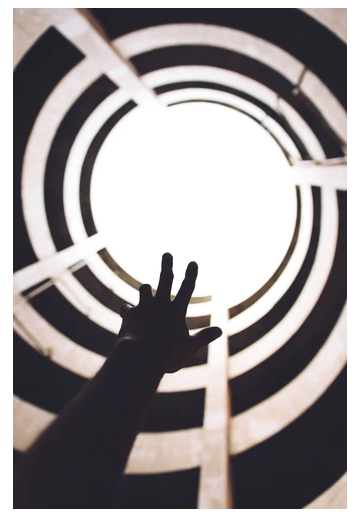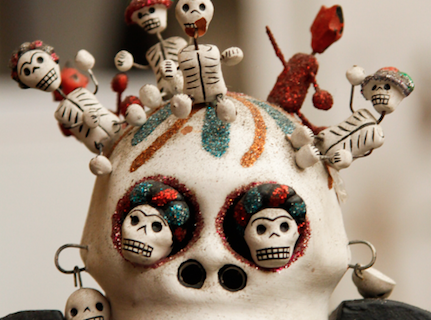
Surrendering to the Spiral Dance of Depression
From galaxies in the sky to diminutive shells on the beach, the spiral is found extensively in the natural world. Its shape and form of a coiled serpent has been used since ancient times as a tool for growth and transformation. The spiral is a guide for entering deep into one’s consciousness and the unknown, and then extending far out into the heavens. It is crucial to surrender to this journey until the exhausted paradigm dissolves in the depths of the psyche and its energy is released to give birth to a new reality…The spiral announces a descent to the depths and a rebirth.
“Mystical Shaman Oracle” by A. Villoldo, C. Baron-Reid and M. Lobos
In my writing and in my everyday life, I’ve been quite open about my history of mental health challenges. It’s not the fact that I enjoy sharing vulnerable personal information that compels me to do this–I don’t. Rather, it is something the activist inside me feels is important to share in order to work towards removing the stigma that many folks who struggle with mental health live with on a daily basis. I hope this article helps to frame depression–and ultimately loss–from a shamanic lens, which is different from the one that mainstream media often presents. I pray that people who may be feeling suicidal know there are other options and that there is always hope.
In Karla McLaren’s ground-breaking book, “The Language of Emotions: What Your Feelings Are Trying to Tell You,” she outlines common and very human emotions that are often labeled as negative by society and shows the intelligence behind each of them as well as their purpose in the psyche. Depression is described as the “stop sign of the soul” that often follows a period of intense grief, sadness or anger around situations that are beyond our control. Depression signals that our approach to the problem at hand is not working and that we need to start moving towards a way of living that is life-giving and soul-feeding–a view the consumerist society we live in does not endorse and actively fights against. Regaining control of how we spend our time is vital if we are to recoup our health.
Depression and anxiety are natural responses to the loneliness, despair, and disconnection that are rampant in our society. In Johann Hari’s brilliant book “Lost Connections,” I learned that only about a quarter of the people living with depression and anxiety have an inherited gene for these conditions AND that gene is only triggered when those folks are living in consistently stressful environments. There are many other people struggling with depression that do not have this gene. This indicates that the society we have created is quite literally making people mentally and emotionally unwell. One of many solutions to this mentioned in Hari’s book is for struggling people to begin to reconnect to their own values and build a community of support around them. Though we can’t change the overarching problem based on hundreds of years of failed social policy overnight, we can begin to reach out and grow our inner toolbox of strategies. If we see friends struggling with depression, we can also find ways to support them. (Depressed people can’t always reach out for help so we have to get better at noticing this in others and helping them find solutions.)
I have wrestled with my mental health since I was a teenager. In my twenties, I went to counseling and opted to go on anti-depressants after a major, unexpected loss in my life. I was depressed, grieving, and began having suicidal thoughts, which scared me. The medication kept me on an even keel for a time and helped me function in my day-to-day life so that I could keep up my university studies as well as my full-time job; I knew this was not a permanent solution. I hated the numb, zombie-feeling it gave me and I could not imagine living the rest of my life like that. Although I did what I could to shift my brain chemistry naturally (exercising, meditating, walks in nature, and singing), I realized that I had to start dealing with the issues that plagued my life within my control because these were adding unnecessary fuel to the mental health vulnerability I’d inherited from my ancestors. I also felt that my ancestors made difficult personal choices that enabled me to grow up in a setting where I had the opportunity to heal and that I owed it to them, my descendants, and to myself to do this work. (A tenant of shamanic medicine is that all the healing work an individual does paves the path for more intergenerational healing for others in the lineage.)
In my late twenties, I started studying shamanism and learned more about lineage patterns, learned behaviours, intergenerational trauma, past life patterns, and energy medicine. As I started challenging beliefs that kept me stuck in a life I didn’t want for myself, I started to begin making conscious choices to engage with people, communities, and activities–including shamanic ceremony–that brought satisfaction, healing, and joy to my life. In addition, I learned how to set healthy boundaries with friends and family. This process took about a decade and although this initially brought more chaos to my life because I was changing patterns that loved ones were used to, it was well worth riding out those waves of uncertainty. Quite naturally over time, people unwilling to respect my personal boundaries faded out of my life and those who were able to hang in with me through the changes entered into more meaningful relationships with me and I with them.
As an adult, I’ve come to see mental health through the lens of spirituality and shamanic medicine and this has helped me to reframe what I experience in my inner world. Recently, I went through another descension into depression after some deep and unexpected losses. I had been mentally stable for a decade and so this came quite unbidden; it caused me to question whether the healing work I’d done the last fifteen years had worked at all! As I moved through this last bout, I realized that there were several differences in my recent experience that showed me I indeed had healed. First, I was able to see that the losses were devastating but absolutely needed at the same time. My psyche was crying out for these changes and was going through a process of clearing out the old patterns in order to make way for the new. Letting go of what did not serve me was much easier this time. Second, I didn’t isolate and suffer in silence as I would have done in my younger years. I reached out to friends who either had experience with mental illness themselves or then were skilled in shamanic healing techniques designed to heal the root causes of mental disturbances. Third, I told my story to folks in my spiritual community. This last one holds a lot of power in shamanic traditions. As I told stories that were buried inside of me that I was too paralyzed to share previously, I saw that others had been through similar things. I was not alone. The act of speaking the truth took the power from the traumatic events. It caused a gap in my psyche where the light could get in.
As I ascended the spiral staircase of depression towards what I know to be life-giving for me, I began to see that we are all spiraling through life lessons and healing at different levels each time we enter into one of these transformational vortexes. As I emerge from this most recent trip, I feel that vulnerable new skin that’s formed and is becoming more defined day by day. I am comfortably uncomfortable in this space as I rebirth myself anew. I know all feelings are temporary and I wait patiently and presently as I watch them pass. I feel this bit of ancient knowledge Penny Billington shares so eloquently in her book “The Path of Druidry:”
We travel, not a repeating cycle, but an eternal spiral. As each season returns, we will be farther along, with more life experience, changes of attitude, and a deeper way of interacting with the seasons.
In this new season of my life, healing has occurred at a deeper level. I am not just learning the same old, tired lessons. I know this because this time, I can see that change is never comfortable and I’ve ceased expecting it to be so. I don’t need to flagellate myself for all my perceived misdeeds in order to facilitate this change: Life sends these spirals to us all of the time. The opportunity in depression is really to learn to surrender to the process of what needs to die in order to be reborn. I no longer feel that I have to eradicate depression from my life in order to be happy. I see it as a teacher now. And I have faith that the next time I go down the rabbit hole (and I likely will), I sense I will see even more growth. I feel I can continue to come through it with less and less negative inner dialogue as I embrace death and change as teachers. The message of hope I leave you with comes from a Facebook meme I’ve seen around lately:
If you rearrange the letters in DEPRESSION, you’ll get “I Pressed On.” Your current situation is not your final destination.
*This article first appeared in the February 2020 edition of Pagan Pages Magazine.*
Recommended Resources
Book: “When the Body Says No: The Cost of Hidden Stress” by Dr. Gabor Maté
Book: “Self-Compassion: The Proven Power of Being Kind to Yourself” by Dr. Kristin Neff
Book: “Lost Connections: Why You’re Depressed and How to Find Hope” by Johann Hari


